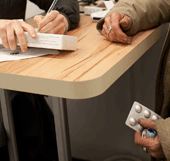
Making health equity a reality through research, education, policy and practice
Education
Social Medicine Special Interest Placements
By Dr Fiona O'Reilly
The North Dublin City GP Training Programme specifically aims to train GPs who will have the capacity and desire to serve the underserved, that is, to work as General Practitioners in areas of deprivation and or provide services for marginal groups in society. Towards this aim the NDCGP has developed a strong social medicine curriculum which is delivered throughout the 4 years of GP Training. In the final year of training a special module has been developed in agreement with GP Registrars and their trainers. This module referred to as the ‘Social Medicine Special Interest Placement’ follows contact theory which advises exposure to and engagement with (contact) people from a particular sector of society about whom stigma exists in order to change attitudes and remove stigma1. The module operates by taking the GP Registrar out of their training practice in fourth year for one day per week to place them in a health care setting which serves socially disadvantaged members of society or those from marginal groups. The GP registrar conducts three such placements in the year for one day per week. Each placement lasts four months. Each placement follows a specific theme of care (drug addiction, homelessness, migrants and prison).
In addition to the on the job learning that the GP Registrars achieve in these placements working alongside doctors, nurses and projects working in these services they also conduct assignment which may include research projects or getting to know patients as people and writing their stories. This facilitates leaning about the social determinants of health.
An evaluation of the programme’s first year including this module demonstrated the newly qualifying GPs felt better prepared for their future career as a result of the module. Through ‘contact’ the placement in services had helped change attitudes and remove fear:
“We wanted a social medicine piece and that might have just been an
aspiration rather than a reality but I think it was a reality for all of us and I think
it has taken away all the fear of ‘difficult patients’ and made us realise that
these are people with difficult lives, that doesn’t mean you have to be afraid of
them. And just yesterday, at the end of 4 years I realised just how different our
mind sets are, when a locum rang me in my room to get him something from
another room because he felt he couldn’t leave the room because the patient
he had in there was on methadone…and I realised that we are so far away from
that, I mean what did he think he was going to do?”
(Fourth year GPR during Focus Group Discussion).
In line with HSE Service Users Involvement Strategy the Social Medicine SIP have implemented a method to give services users an opportunity to rate the GPRs through completion of a service users feedback form.
An analysis of results of service user feedback forms reveals satisfaction with the GP Registrars.
“It's a lot better when you are asked how you are and it is meant rather than
just typing the script and goodbye.”
“I found (names GPR) to be really nice and doesn't rush you out the door and even
asks about how things are going at home and with the kids and things in general”
“I thought the doctor was one of the most excellent doctors I've ever had at everything she has done for me as a patient”
The services into which GPRs are placed also benefited from the programme with more medical manpower more patients could be seen or given more time and thus a better quality service.
For further information contact: Dr Fiona O’Reilly, Assistant Programme Director, North Dublin City GP Training Programme. Primarycare@healthequity.ie
1 Allport, G. W. (1954). The nature of prejudice. Reading, MA: Addison-Wesley. Pettigrew, T. F., & Tropp, L. R. (2006). A meta-analytic test of intergroup contact theory. Journal of Personality and Social Psychology,
90, 751–783.






